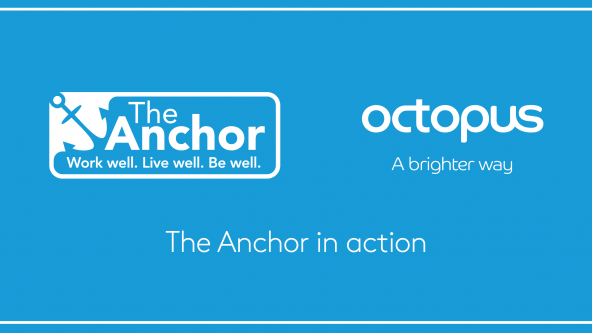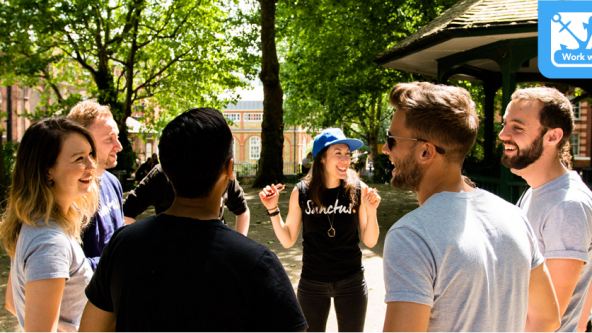At Octopus, we often talk about resilience as being part of our DNA. But what does that mean in practice? Here are six essential resilience traits that can help show your resilience. And if you can give examples in each category, then a career at Octopus might be right for you.
1. You’re not afraid to fail, as long as it gets you closer to your goal
The very definition of resilience is to not give up when you face hard times. But throughout your working career it can be difficult to stay positive in the face of repeated setbacks. It’s worth remembering that every successful entrepreneur has a catalogue of failure they can point to.
Take James Dyson as an example. Over 15 years, he created 5,127 different vacuum cleaner prototypes, each a ‘failure’ in its own way. Today, the Dyson company employs more than 7,000 people worldwide. Dyson’s patented cyclone technology features in a range of products, from air purifiers to hairdryers to light fittings. And the company still views itself as a group of inventors trying to make things better. Fear of failure can be a real inhibitor to success. Sam Handfield-Jones in Octopus Labs recently wrote a great blog devoted to this topic.
“By the time I made my 15th prototype, my third child was born. By 2,627, my wife and I were really counting our pennies. By 3,727, my wife was giving art lessons for some extra cash. These were tough times, but each failure brought me closer to solving the problem.”
James Dyson
2. You take the hard path instead of choosing the easy option
Work is hard-going sometimes. There are times when you’ll have to do things that make you uncomfortable or that you just don’t want to do, whether that means shelving a project that you’ve become heavily invested in, criticising someone else’s work, or having your own work torn apart. We all have to go to meetings that we think are a waste of time, or we struggle to get our points across with people who don’t share our point of view.
The critical thing to remember is that resilience is like a muscle, the more you force yourself to use it, the bigger it grows. Here at Octopus, giving and receiving feedback is seen as a hugely important part of everyone’s career development. It would be easy to seek out those people that you know will give you positive feedback, but the real value usually lies in having the courage to actively choose the more difficult conversations.
Doing this in a setting which is respectful and encourages two-way dialogue is a way to make these difficult conversations slightly less awkward, and ensures both parties get something meaningful out of it. People that are able to consistently be relied on to make the tough decisions or to put themselves into the line of fire – including giving and receiving difficult feedback – get themselves noticed. They realise that short-term pain is going to make them stronger in the long run, and that never settling for the easy option shows real character.
“I don’t count my sit-ups, I only start counting when it starts hurting, when I feel pain, cause that’s when it really matters.”
Muhammad Ali
3. You know when to trust your instincts
Resilience is often about having the courage to make quick, but thoughtful decisions. But there’s a big difference between being instinctive and being impulsive. When you’ve got a difficult decision to make ‘trusting your gut’ may seem the riskiest option, but following your natural instincts can help you make good choices. That’s because two things shape your resilience: (1) your past experiences, and (2) the knowledge you gained from them. So, you shouldn’t be afraid of going with the option that ‘feels right’.
However, having good instincts often means choosing when to fight your battles. When we feel under pressure, losing control or struggling to cope with something unexpected, it’s very easy to let negative emotions run riot. ‘Having your guard up’ all the time is not only exhausting but can prevent you from making the right decisions during times when it’s best to have a cool head. In times like this, it might be wiser to put off making a decision until you’ve given yourself enough time and space to feel less emotionally attached.
“Courage is what it takes to stand up and speak, it’s also what it takes to sit down and listen.”
Winston Churchill
4. You’re able to adapt
Life doesn’t come at any of us in a straight line. Each of us is going to experience unexpected twists and turns that we never thought likely – what Winston Churchill called “unforeseeable and uncontrollable events”. The way we respond to these events is key to our character.
Resilience also reflects our ability to cope with change and to be ready to pivot to Plan B when things haven’t turned out the way we expected them to. It’s not so much about ‘bouncing back’ when something unexpected happens, it’s more about having the ability to keep pushing forward, even if it means sometimes heading in a completely different direction.
“You don’t learn to walk by following the rules.
You learn by doing, and by falling over.”
Richard Branson
5. But you recognise you can’t do things on your own
At Octopus we pride ourselves on having a culture where people feel empowered to give and receive support. No-one is expected to handle difficult change on their own, and the most resilient people understand the importance of seeking support now and then.
It’s worth noting that people are more likely to remember the way that you deal with a problem, rather than the problem itself. It’s easy to slip into negative thinking, to blame others, or to allow your mood to negatively affect the people around you. Having a strong support network at work, even if it’s just someone you can chat to over a coffee, can make all the difference in how you approach the things that are troubling you. Resilient people are also more likely to be empathetic and compassionate when other people are going through difficult times.
“In the long history of humankind (and animalkind, too) those who learned to collaborate and improvise most effectively have prevailed.”
Charles Darwin
6. When the time comes, you’re ready to lead
It’s no surprise that the best leaders display resilience in bucket loads. They have become successful by working harder and smarter, not giving up, and overcoming negativity and doubt. But more importantly, they help to inspire the same in others. They lead by example, stay positive despite challenges, and they inspire the people around them.
“Leadership is a way of thinking, a way of acting and, most importantly, a way of communicating.”
Simon Sinek
Resilience can’t be taught, but it can be nurtured and developed. And summoning up past examples of your own resilience can be enormously powerful when you need to call on it once again. When it comes to building a career, being able to show clear evidence of times when you’ve displayed these characteristics could prove hugely valuable.
Interested in working at Octopus? Take a look at our careers section.


